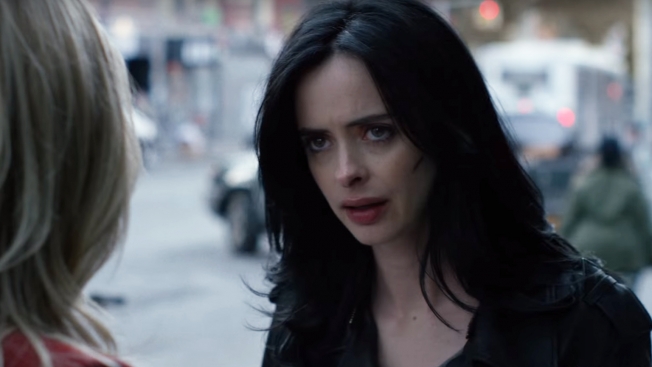
Of all the superheroes Marvel is bringing to big screens and small these days, Jessica Jones is the only one I had never heard of before. So, going into the 13-episode Netflix series, I didn’t know what to expect. Some Internet research and a comics-savvy friend brought me up to speed on who she is, her backstory, and her relationship with Luke “Power Man” Cage. This knowledge made the viewing experience that much richer for me, I think, but anyone going into the series blind should have no problem enjoying it. That’s because Jessica Jones is, quite simply, one of the best TV shows of the year.
Jones’s backstory is pretty disturbing, and for a number of reasons I was wondering how the TV series would tackle it, if at all. Turns out the answer is: head-on and fearlessly. Like Daredevil before it, this isn’t a superhero show for younger viewers. I questioned that decision for Daredevil, who is a hero known to adults and children alike, but it’s the right call for Jessica Jones. This series has a lot of violence, bad language (the word “shit” is used at least once an episode), sex (it’s not explicit, there’s no nudity, but you certainly know what they’re doing), and a generally disturbing subject matter that might put a cap on just how many episodes you can watch in one sitting before you have to indulge in a unicorn chaser to cleanse your palate. It has to have these things in order to be true to itself and its theme, and that fearless authenticity is what makes the show so special.
The cast is phenomenal. I only knew Krysten Ritter (above) from Apartment 23, which was a sitcom I didn’t even watch, but she so fully inhabits the role of Jessica Jones that now when I see images from the comic book online the character doesn’t look right to me because it’s not her. Ritter brings a world-weariness, a sardonic attitude, and a lot of hidden depth, all of which brings the character to life. David Tennant is superb as the villain Kilgrave. I’d never seen him act as a villain before — well, maybe in that one Harry Potter movie, but I was hardly paying attention — and like Ritter, he throws himself so fully into the role that he becomes synonymous with it. (To the producers’ credit they did not make Kilgrave purple like in the comics, because it would have looked ridiculous.) Everyone is great, but among the other standouts are Rachael Taylor as Jones’s best friend and foster sister Trish Walker, Mike Colter as Luke Cage, Eka Darville as Jones’s strung-out neighbor Malcolm, and Erin Moriarty as the tragic Hope Schlottman. Colby Minifie in particular deserves a special shout-out as Jones’s annoying upstairs neighbor Robyn. She brings an unexpected emotional depth to what could have been a one-note character.
I never read the Jessica Jones comic book series, Alias, but I thought they did a great job developing the story for a TV series. Every episode pushed the plot and the characters forward without filler. To be honest, I think Jessica Jones might be better than Daredevil, and I liked Daredevil a lot. But Daredevil felt bloated with unnecessary scenes and characters (pretty much everything with Vanessa, for me), and its large-scale story with warring mobsters and exploding buildings didn’t feel as compelling as Jessica Jones‘s more intimate, smaller-scale one. There’s plenty of action here and things do explode, but by keeping things on a more personal level I think it keeps things interesting.
I’ll tell you this: After a sneak peek at Luke Cage in Jessica Jones, I can’t wait for his solo series. I’m getting pretty psyched for The Defenders now, too. Watching Ritter’s Jones try to get along with other heroes is going to be a hell of a lot of fun.


Leave a Reply